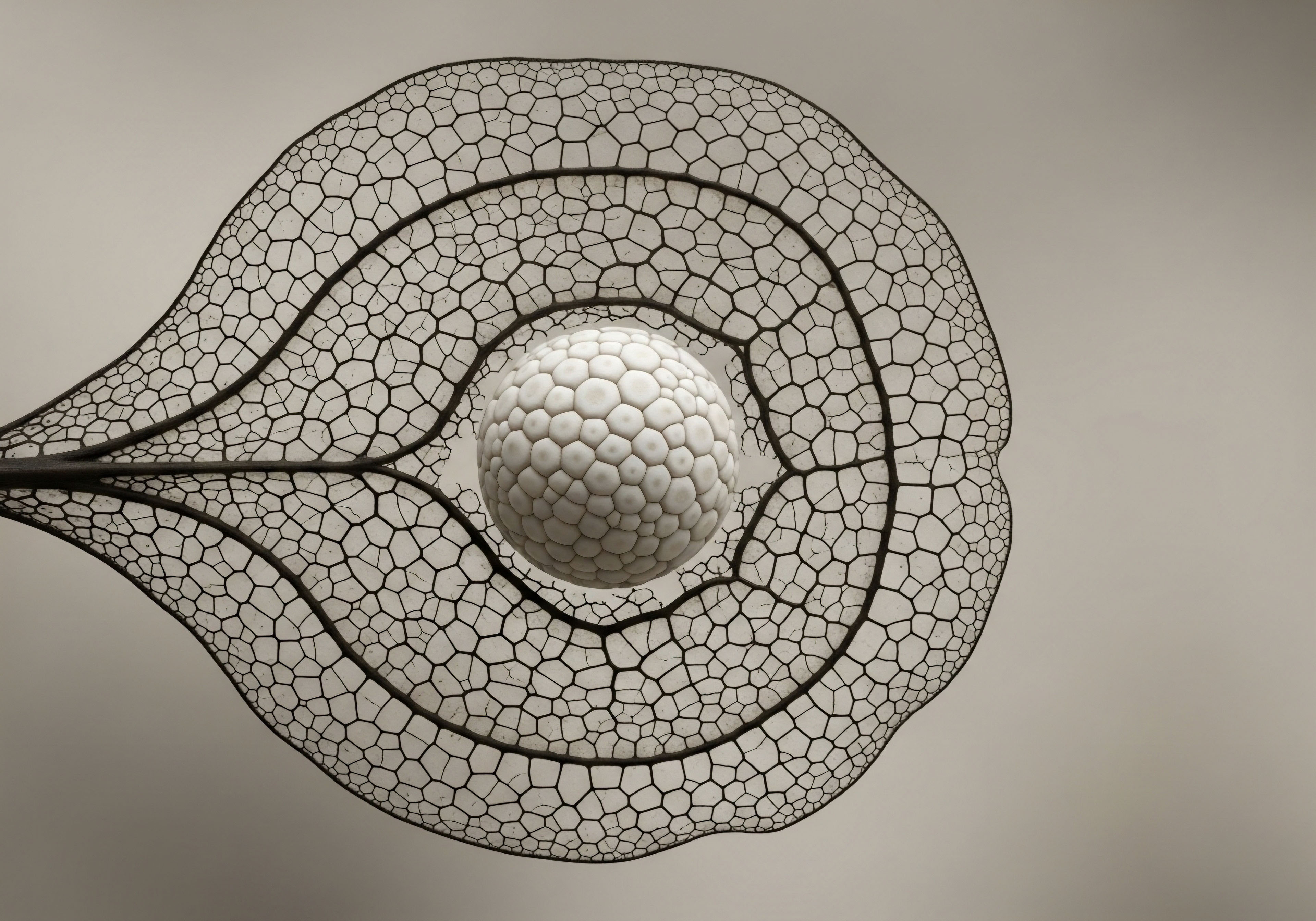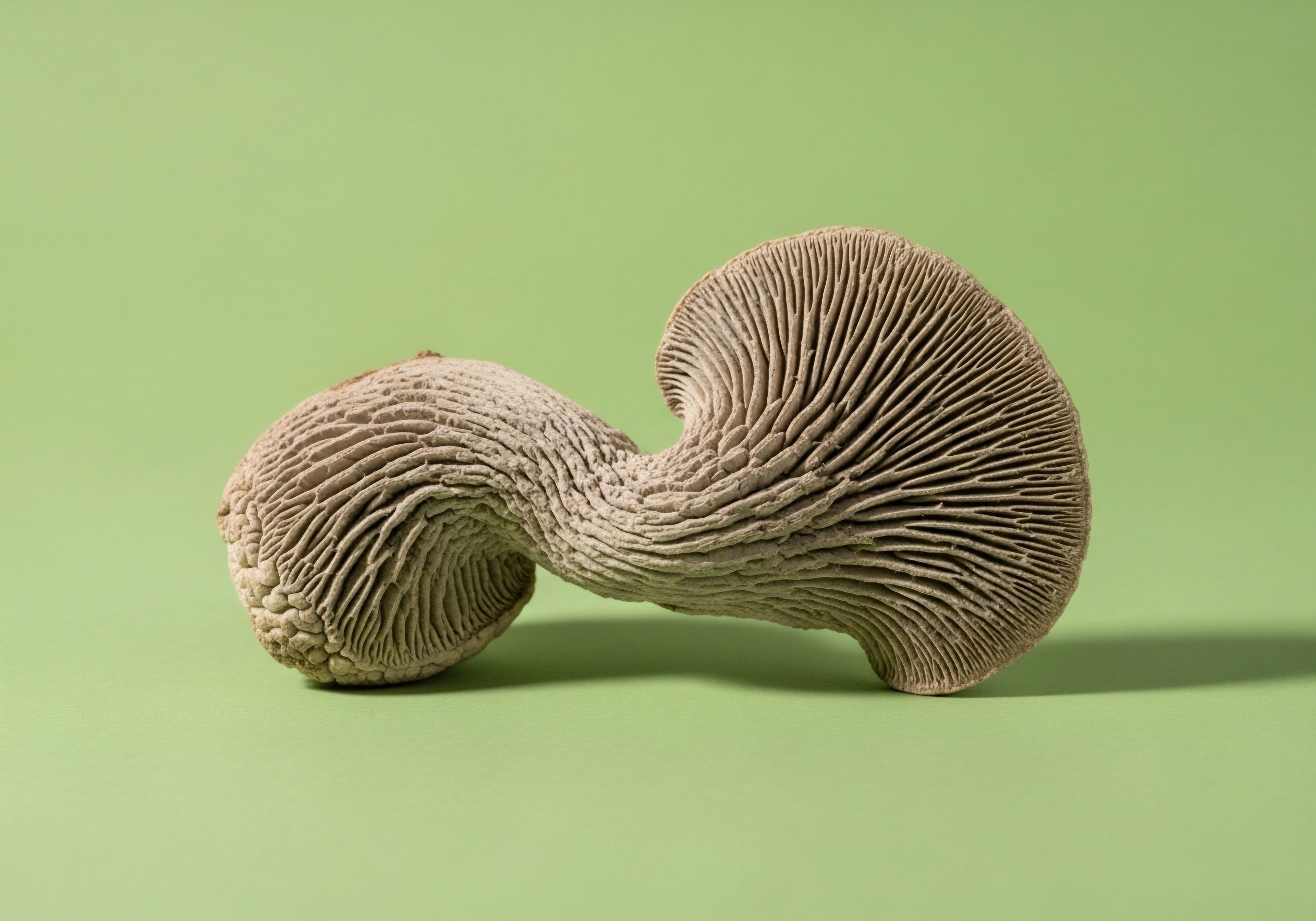

Fundamentals
Do you ever feel as though an invisible hand controls your daily energy, your mood, or even your sleep patterns? Many individuals experience a persistent sense of being “off,” a subtle yet pervasive feeling that their internal systems are not quite aligned.
This sensation often manifests as persistent fatigue, difficulty managing stress, or an inability to maintain a stable weight, despite consistent efforts. These experiences are not simply subjective; they frequently point to an underlying imbalance within the body’s intricate communication networks, particularly those involving our adrenal glands. Understanding these biological systems provides a pathway to regaining control over your vitality and function.
The adrenal glands, small structures perched atop your kidneys, serve as central command centers for your body’s stress response. They produce vital hormones, including cortisol, often called the “stress hormone,” and dehydroepiandrosterone (DHEA), a precursor to other hormones like testosterone and estrogen. Cortisol helps regulate blood sugar, reduce inflammation, and manage the body’s reaction to stress.
DHEA, conversely, plays a role in energy, immune function, and overall well-being. A delicate balance between these hormones is essential for optimal health. When this balance is disrupted, it can lead to a cascade of symptoms that affect every aspect of daily existence.
The adrenal glands are vital for stress response and hormonal balance, producing cortisol and DHEA.
Berberine, a natural compound derived from various plants, has garnered considerable scientific interest for its wide-ranging biological actions. Historically, traditional medicine systems have utilized this alkaloid for centuries, recognizing its influence on various bodily processes. Modern research has begun to unravel the specific mechanisms through which berberine interacts with human physiology.
Its primary recognized effects involve metabolic regulation, particularly its influence on glucose and lipid metabolism. This metabolic modulation, as we will explore, holds indirect yet significant implications for adrenal hormone production and the broader endocrine system.

Adrenal Gland Function and Hormonal Output
The adrenal glands consist of two main parts ∞ the cortex and the medulla. The adrenal cortex produces steroid hormones, including glucocorticoids (like cortisol), mineralocorticoids (like aldosterone), and adrenal androgens (like DHEA). The adrenal medulla produces catecholamines, such as adrenaline and noradrenaline, which are involved in the immediate “fight or flight” response.
The production of these hormones is tightly regulated by a complex feedback system known as the hypothalamic-pituitary-adrenal (HPA) axis. This axis acts like a sophisticated internal thermostat, constantly adjusting hormone levels to maintain equilibrium.
When you encounter a stressor, whether physical or psychological, your hypothalamus releases corticotropin-releasing hormone (CRH). This signals the pituitary gland to secrete adrenocorticotropic hormone (ACTH), which then stimulates the adrenal cortex to produce cortisol. Under healthy conditions, elevated cortisol levels provide negative feedback to the hypothalamus and pituitary, signaling them to reduce CRH and ACTH production, thereby dampening the stress response.
Chronic or excessive stress can dysregulate this feedback loop, leading to sustained high cortisol levels, which can have detrimental long-term effects on metabolic health, immune function, and other hormonal systems.

Initial Considerations for Berberine and Adrenal Health
Early investigations into berberine’s effects on adrenal hormone production often stem from its established benefits in metabolic health. Conditions like insulin resistance and type 2 diabetes frequently exhibit dysregulation of the HPA axis, characterized by elevated cortisol levels. By improving insulin sensitivity and glucose metabolism, berberine might indirectly alleviate some of the metabolic stress that contributes to adrenal overactivity.
This suggests a potential for berberine to support adrenal balance by addressing underlying metabolic disturbances, rather than directly targeting the adrenal glands themselves in all contexts.


Intermediate
Understanding the precise mechanisms through which a compound influences our internal chemistry requires a deeper look into clinical observations and cellular interactions. Berberine’s impact on adrenal hormone production is not a simple, direct action, but rather a sophisticated interplay with various physiological pathways. The evidence suggests that its influence is largely mediated through its well-documented effects on metabolic regulation and systemic inflammation, which in turn affect the adrenal glands’ workload and signaling.

Berberine’s Metabolic Influence on Adrenal Function
A primary mechanism of berberine involves the activation of AMP-activated protein kinase (AMPK), an enzyme that serves as a master regulator of cellular energy balance. When AMPK is activated, it promotes glucose uptake, fatty acid oxidation, and inhibits glucose production in the liver, thereby improving insulin sensitivity and reducing blood sugar levels.
Chronic insulin resistance and hyperglycemia place significant strain on the body, often leading to increased cortisol secretion as the body attempts to mobilize energy stores and counteract metabolic stress. By ameliorating these metabolic imbalances, berberine can indirectly reduce the demand on the adrenal glands to produce excessive cortisol.
Berberine’s activation of AMPK improves metabolic health, potentially easing adrenal strain.
Consider the body’s metabolic system as a complex internal communication network. When signals are clear and efficient, like a well-maintained data highway, information flows smoothly. Insulin resistance creates “traffic jams” in this network, forcing the adrenal glands to send out more “emergency signals” (cortisol) to keep things moving. Berberine, by improving insulin sensitivity, helps clear these traffic jams, allowing the adrenal glands to operate more calmly.
Beyond its direct metabolic effects, berberine exhibits potent anti-inflammatory and antioxidant properties. Chronic low-grade inflammation, a common feature of metabolic dysfunction, can act as a persistent stressor on the HPA axis, leading to sustained cortisol elevation. By reducing systemic inflammation, berberine helps to quiet this background noise, allowing the adrenal glands to function within a more balanced physiological environment. This reduction in inflammatory signaling can contribute to a more regulated HPA axis response over time.

How Does Berberine Affect Cortisol Production?
Research, particularly in animal models, indicates that berberine can directly modulate components of the HPA axis. Studies on rats with type 2 diabetes have shown that berberine administration significantly reduced levels of hypothalamic Orexin-A, the OX2R receptor, CRH, pituitary ACTH, and both serum and urine corticosterone (the rodent equivalent of cortisol). This suggests a direct inhibitory effect on the hyperactivity of the HPA axis often observed in conditions of metabolic stress.
This modulation of the HPA axis is a significant finding, as it points to berberine’s capacity to influence the central regulation of stress hormones. The reduction in CRH and ACTH implies a dampening of the signals that prompt the adrenal glands to produce cortisol. This mechanism provides a more direct link between berberine and adrenal hormone output, beyond just its metabolic benefits.
The table below summarizes some of the observed effects of berberine on HPA axis components and related markers:
| HPA Axis Component / Marker | Observed Effect with Berberine | Reference |
|---|---|---|
| Hypothalamic Orexin-A | Decreased levels | |
| Corticotropin-Releasing Hormone (CRH) | Decreased levels | |
| Adrenocorticotropic Hormone (ACTH) | Decreased plasma levels | |
| Serum Corticosterone (Cortisol) | Decreased levels | |
| Urine Corticosterone (Cortisol) | Decreased levels |

Berberine and DHEA Synthesis
The relationship between berberine and DHEA is less straightforward and appears to be influenced by the specific physiological context, particularly in conditions like polycystic ovary syndrome (PCOS). DHEA is an adrenal androgen precursor, and its levels can be elevated in conditions of adrenal dysfunction or hyperandrogenism.
Some research indicates that berberine can influence enzymes involved in steroid synthesis. Specifically, it has been shown to lower the expression of the CYP17a1 gene, which encodes an enzyme responsible for converting pregnenolone to 17-hydroxypregnenolone and subsequently to DHEA. This action could theoretically lead to a reduction in DHEA synthesis.
Conversely, berberine may increase the expression of CYP19a1, which encodes aromatase, an enzyme that converts androgens into estrogens. These dual effects suggest a complex modulation of steroidogenesis, rather than a simple increase or decrease in DHEA.
In the context of PCOS, where elevated androgens (including DHEA) are a common feature, berberine’s ability to influence these pathways is considered beneficial. Clinical studies in women with PCOS have shown that berberine can reduce total testosterone levels and the free androgen index, while increasing sex hormone-binding globulin (SHBG). While these studies primarily focus on androgen reduction, the underlying mechanisms involving enzymes like CYP17a1 and CYP19a1 suggest an indirect impact on DHEA production and metabolism.

Integrating Berberine with Hormonal Optimization Protocols
For individuals engaged in hormonal optimization protocols, such as Testosterone Replacement Therapy (TRT) for men or women, or other endocrine system support strategies, understanding berberine’s influence on adrenal hormones becomes particularly relevant. The goal of these protocols is to restore physiological balance. If an individual experiences chronic stress or metabolic dysregulation, it can impede the effectiveness of exogenous hormone administration or even exacerbate symptoms.
Consider a male patient on TRT experiencing persistent fatigue or mood disturbances despite optimized testosterone levels. This could stem from an overactive HPA axis and elevated cortisol, which can counteract the benefits of testosterone. In such cases, berberine’s potential to modulate the HPA axis and improve metabolic health could serve as a complementary strategy to support overall endocrine function and enhance treatment outcomes.
Similarly, for women undergoing hormonal balance protocols, particularly those with underlying metabolic challenges or PCOS, berberine’s influence on androgen metabolism and insulin sensitivity could be a valuable addition to their biochemical recalibration.
Any integration of berberine with existing hormonal protocols requires careful clinical oversight and regular monitoring of relevant biomarkers. The interaction between metabolic health, adrenal function, and gonadal hormone levels is highly interconnected. A comprehensive approach considers how each therapeutic agent contributes to the overall systemic balance.


Academic
A deeper examination of berberine’s long-term effects on adrenal hormone production necessitates a rigorous analysis of its molecular interactions and the intricate feedback loops governing the endocrine system. The evidence, while still evolving, points to a sophisticated modulatory capacity, particularly within the context of metabolic stress and systemic inflammation. This is not a simple direct stimulation or suppression, but rather a recalibration of the body’s internal regulatory mechanisms.

Molecular Mechanisms of HPA Axis Modulation
The primary mechanism through which berberine influences adrenal hormone production appears to be its impact on the HPA axis, specifically by attenuating its hyperactivity. Studies in animal models of type 2 diabetes, a condition often associated with HPA axis overactivity, demonstrate that berberine significantly reduces the expression and secretion of key signaling molecules along this axis.
This includes a measurable decrease in hypothalamic corticotropin-releasing hormone (CRH), the initial signal in the stress response cascade. Downstream, pituitary adrenocorticotropic hormone (ACTH) levels also decline, leading to a subsequent reduction in adrenal gland production of corticosterone (cortisol in humans). This inhibitory effect on the HPA axis is a critical finding, suggesting that berberine can help restore a more balanced stress response, preventing the chronic elevation of glucocorticoids that can lead to adverse health outcomes.
The precise molecular targets for this HPA axis modulation are still under investigation, but they likely involve berberine’s known influence on cellular energy sensing and inflammatory pathways. Berberine’s activation of AMP-activated protein kinase (AMPK) plays a central role.
AMPK is a cellular energy sensor that, when activated, can influence gene expression and protein synthesis, including those involved in steroidogenesis and stress signaling. By improving cellular energy metabolism, AMPK activation can reduce the metabolic burden that often triggers HPA axis overactivity.
Berberine modulates the HPA axis by reducing CRH, ACTH, and cortisol, likely via AMPK activation.
Furthermore, berberine’s anti-inflammatory properties contribute to HPA axis regulation. Chronic inflammation can directly stimulate CRH release from the hypothalamus, perpetuating a cycle of stress hormone elevation. By suppressing inflammatory mediators, berberine helps to break this cycle, allowing the HPA axis to return to a more homeostatic state. This systemic anti-inflammatory action provides a broader context for its observed effects on adrenal hormones.

Berberine’s Influence on DHEA and Steroidogenesis
The impact of berberine on DHEA production is more intricate, involving specific enzymatic pathways within the adrenal glands and gonads. DHEA synthesis is part of the broader steroidogenesis pathway, which begins with cholesterol and involves a series of enzymatic conversions. A key enzyme in this process is CYP17a1 (17α-hydroxylase/17,20-lyase), which catalyzes the conversion of pregnenolone and progesterone into 17-hydroxypregnenolone and 17-hydroxyprogesterone, and subsequently into DHEA and androstenedione.
Research indicates that berberine can decrease the expression of the CYP17a1 gene. A reduction in CYP17a1 activity would logically lead to a decrease in the production of DHEA and other androgens. This effect is particularly relevant in conditions characterized by androgen excess, such as PCOS, where berberine has shown efficacy in reducing elevated testosterone levels and improving androgenic symptoms.
Conversely, berberine has been observed to increase the expression of CYP19a1, the gene encoding aromatase. Aromatase is the enzyme responsible for converting androgens (like testosterone and androstenedione) into estrogens. An increase in aromatase activity could lead to a greater conversion of available androgens into estrogens, further contributing to a reduction in circulating androgen levels, including those derived from DHEA.
This dual action on steroidogenic enzymes highlights berberine’s capacity to recalibrate the balance of sex hormones, which are intimately connected with adrenal function.
The long-term implications of these enzymatic modulations require careful consideration. While beneficial in hyperandrogenic states, the chronic suppression of DHEA synthesis could be a concern in individuals with already low DHEA levels or those seeking to optimize DHEA for its anabolic and neuroprotective properties. This underscores the necessity of personalized biochemical monitoring when incorporating berberine into a long-term wellness protocol.

Interplay with Metabolic Pathways and Systemic Balance
The long-term effects of berberine on adrenal hormone production cannot be isolated from its broader metabolic and anti-inflammatory actions. The body operates as an interconnected system, where changes in one pathway inevitably influence others.
For instance, chronic insulin resistance leads to elevated insulin levels, which can directly stimulate adrenal androgen production and contribute to HPA axis dysregulation. By improving insulin sensitivity, berberine addresses a root cause of metabolic stress that indirectly impacts adrenal function. This systemic recalibration reduces the chronic signaling burden on the adrenal glands, allowing them to operate more efficiently and within a healthier range.
The following list outlines key systemic effects of berberine that contribute to its influence on adrenal hormones:
- AMPK Activation ∞ Improves cellular energy metabolism, reducing metabolic stress on the HPA axis.
- Insulin Sensitivity Enhancement ∞ Lowers circulating insulin, which can reduce direct stimulation of adrenal androgen production.
- Anti-inflammatory Properties ∞ Decreases systemic inflammation, thereby reducing a chronic stressor on the HPA axis.
- Antioxidant Effects ∞ Protects cells from oxidative stress, supporting overall cellular health, including adrenal cells.
- Gut Microbiome Modulation ∞ Influences gut health, which has bidirectional communication with the endocrine system and stress response.
The long-term clinical data on berberine’s direct effects on adrenal hormone production in humans, particularly in healthy individuals or those without pre-existing metabolic conditions, remain less extensive than its metabolic research. Most studies demonstrating HPA axis modulation are conducted in animal models or in human populations with metabolic disorders where HPA axis hyperactivity is a known feature.
This highlights the need for more targeted, long-duration human trials to fully characterize its precise and sustained impact on adrenal hormone profiles across diverse populations.
When considering long-term supplementation, a personalized approach is paramount. Regular monitoring of cortisol (e.g. salivary cortisol rhythms) and DHEA levels, alongside metabolic markers like fasting glucose, insulin, and HbA1c, provides a comprehensive picture of berberine’s systemic effects. This allows for precise adjustments to dosage or protocol, ensuring that the intervention supports the individual’s unique biological systems without unintended consequences. The goal is always to restore optimal physiological function, allowing the body’s inherent regulatory intelligence to prevail.

References
- An, Y. Sun, Z. Zhang, Y. Liu, Y. Guan, Y. & Lu, M. (2015). The effect of berberine on the HPA-axis pathway and skeletal muscle GLUT4 in type 2 diabetes mellitus rats. Diabetes, Metabolic Syndrome and Obesity ∞ Targets and Therapy, 12, 1717 ∞ 1725.
- An, Y. Sun, Z. Zhang, Y. Liu, Y. Guan, Y. & Lu, M. (2019). Effect of berberine on the HPA-axis pathway and skeletal muscle GLUT4 in type 2 diabetes mellitus rats. Diabetes, Metabolic Syndrome and Obesity ∞ Targets and Therapy, 12, 1717 ∞ 1725.
- Chang, W. Chen, L. & Xie, J. (2015). Berberine regulates AMP-activated protein kinase signaling pathways and inhibits colon tumorigenesis in mice. Oncotarget, 6(4), 2320 ∞ 2332.
- Jurgiel, J. (2023). The role of berberine in polycystic ovary syndrome ∞ a summary of knowledge. Ginekologia i Perinatologia Praktyczna, 8(4), 183 ∞ 188.
- Lee, B. Shim, I. Lee, H. & Hahm, D. H. (2018). Berberine alleviates symptoms of anxiety by enhancing dopamine expression in rats with post-traumatic stress disorder. The Korean Journal of Physiology & Pharmacology, 22(2), 163 ∞ 170.
- Li, Z. Geng, Y. Jiang, J. & Kong, W. (2014). Research progress on antidepressant effects and mechanisms of berberine. Frontiers in Pharmacology, 5, 123.
- Liu, Y. Li, X. Liu, J. & Li, Y. (2017). Berberine-induced nucleolar stress response in a human breast cancer cell line. Biochemical and Biophysical Research Communications, 528(1), 227 ∞ 233.
- Moss, M. (2018). Berberine ∞ Regulating Obesity and the Gut Microbiota. Integrative Medicine in San Diego, CA.
- Panahi, N. Mahmoudian, M. & Mortazavi, P. (2017). Berberine Modulates amyloid-β Peptide Generation by Activating AMP-activated Protein Kinase. Neuropharmacology, 125, 408 ∞ 417.
- Shen, Y. Wang, X. & Jin, L. (2016). Neuroprotective effect and preparation methods of berberine. Frontiers in Pharmacology, 7, 499.
- Sun, Y. Yu, Y. Li, X. & Zhang, H. (2014). Effect of berberine on the HPA-axis pathway and skeletal muscle GLUT4 in type 2 diabetes mellitus rats. Diabetes, Metabolic Syndrome and Obesity ∞ Targets and Therapy, 12, 1717 ∞ 1725.
- Yi, T. Zhang, H. & Yu, Y. (2021). Berberine alleviates inflammation in polycystic ovary syndrome by inhibiting hyaluronan synthase 2 expression. Phytomedicine, 128, 155456.
- Zhang, H. Yu, Y. & Li, X. (2016). Berberine Regulation of Cellular Oxidative Stress, Apoptosis and Autophagy by Modulation of m6A mRNA Methylation through Targeting the Camk1db/ERK Pathway in Zebrafish-Hepatocytes. MDPI, 11(12), 1819.

Reflection
As we conclude this exploration, consider the profound implications of understanding your own biological systems. The journey toward reclaiming vitality is not a passive one; it requires an active engagement with the signals your body sends and a willingness to investigate the underlying mechanisms. The information presented here about berberine and its influence on adrenal hormone production serves as a starting point, a piece of the larger puzzle that constitutes your unique physiological landscape.
Each individual’s endocrine system operates with distinct sensitivities and responses. What works for one person may require careful adjustment for another. This knowledge empowers you to ask more precise questions, to seek out personalized guidance, and to collaborate with clinicians who prioritize a deep, data-driven understanding of your internal environment. Your body possesses an inherent intelligence, and by providing it with the right support, you can facilitate its return to a state of optimal function.
The path to sustained well-being is a continuous process of learning, adaptation, and thoughtful intervention. May this discussion serve as a catalyst for your continued pursuit of a life lived with full energy and purpose.



